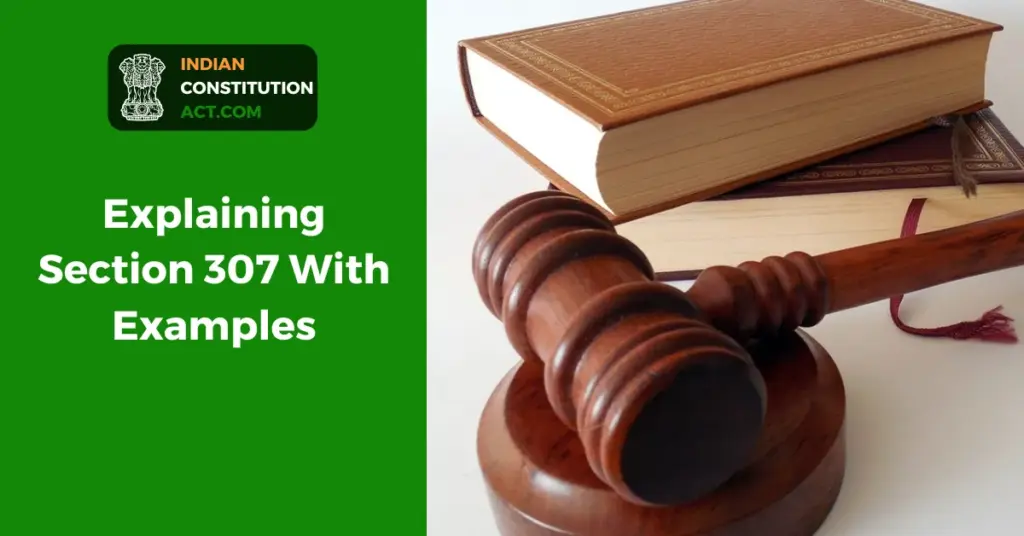Before moving towards Section 307, the first thing you must know is that the intention of the accused person is very essential point in every crime judgment. Now let’s move ahead toward IPC 307, often referred to as Dhara 307 or Section 307 IPC, an important legal provision dealing with attempted killing.
Table of Contents
What Is Section 307 IPC?
Try to kill section also known as Section 307 IPC, states the action of trying to kill and its interconnected penalty. As per the IPC Section 307, If a person does something knowing that it can kill the other person, then he will be punished. There is a high chance that the accused has to serve 8 years in prison, a fine, or both. If the accused harms the victim by the act knowing that this thing can even kill the other person then life imprisonment can be given to the accused.
Explaining Section 307 With Examples

(1). Person ‘A’ buys a gun to kill ‘Z’. Then after a few days ‘A’ shoots ‘Z’. And by this act of ‘A’, ‘Z’ got hurt. The crime performed by person ‘A’ comes under IPC 307.
(2). Person ‘A’ decides to kill person ‘Z’ by giving poison. The person ‘A’ purchases poison for Z. Till now, person A does not perform any illegal activity or crime. But this act also comes under the Dhara 307 also known as IPC Section 307.
(3). Person ‘A’ kidnaps his friend’s child to kill him, but does not cause any harm to the child. But this act is also a crime and comes under Section 307.
Also read: What Is Section 376 IPC: Is It Bailable Or Not?
Punishment For Attempt To Murder (Section 307 IPC)
Thinking of killing someone or trying to kill someone is considered a very punishable offense in India. And for this, the punishment can be more than 8 years or even life imprisonment.
Different Punishments Under Section 307
- Sentenced To 10 Years And More
If any citizen of India does any activity to kill the person but is unable to do anything, then he can be punished with 10 years of imprisonment or more.
- Sentenced For Lifetime Or Other Charges
If you have done such an activity through which someone is harmed badly then you might be sentenced for a lifetime or some other charges can be applied to you by the court.
- Special Provision for Life Convicts
There is a special case in which the accused, is already serving life imprisonment and again tries to kill or harm someone, then the accused may receive a death sentence by the government officials.
- Non-Bailable Offense:
Yes, Section 307 is non-baible crime. Sometimes there is a high chance that the accused will not get bail from the court.
- Non-Compoundable Offense
There are many Sections in IPC, in which both parties settle the case outside the court. But we would like to inform our readers that this crime is not non-compoundable. It means that the accused and victim can not solve the matter outside the court.
- Cognizable Offense
As per the orders by the Supreme Court Of India, the police officer must register an FIR. And police must perform an investigation of the crime. Yes, Section 307 IPC is a cognizable crime.
Understanding the Seriousness of Punishments
The content of penalties under Section 307 of the Indian Penal Code mirrors the sincerity with which the law views attempted murder.
The punishment is decided by the court but there are many reasons behind it. For example, the accused intention, harm caused or not, and the history of the accused, all these factors play a major role before sentencing.
Intent to Kill
The victim has to convince the court that the accused intention was to kill him. And if the victim was not able to do so then the harshness of the harm caused can’t be defined.
Use of Deadly Weapons
We would like to inform you that if the accused used any lethal weapon or attacked the victim then it is sufficient for the evidence of intent.
Previous Convictions
If the person who committed the crime is already a criminal and has some criminal charges then the harshness of the punishment will be much higher.
